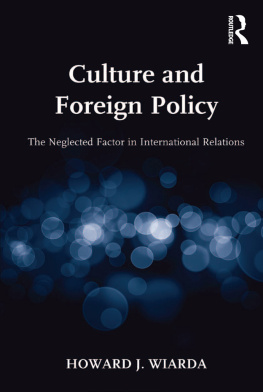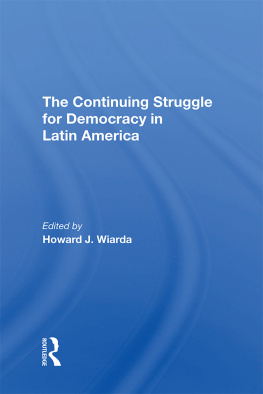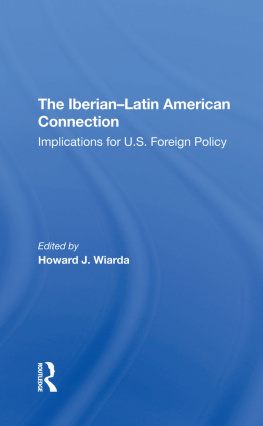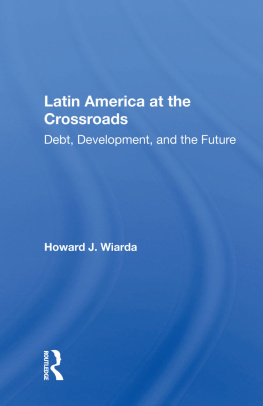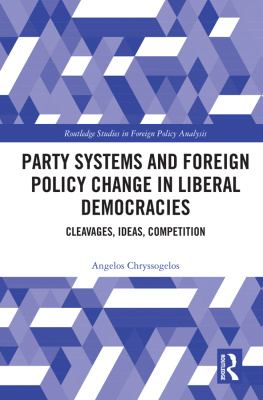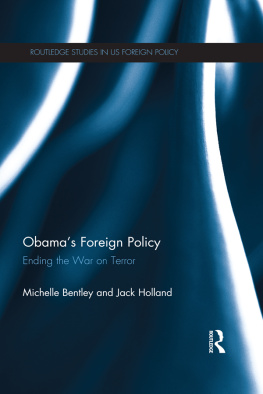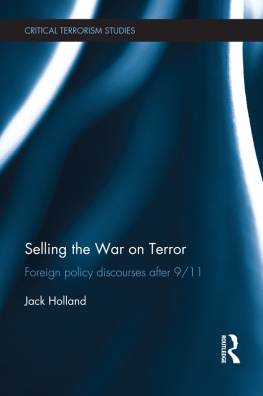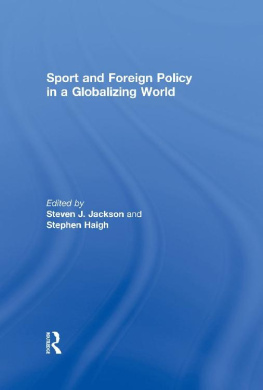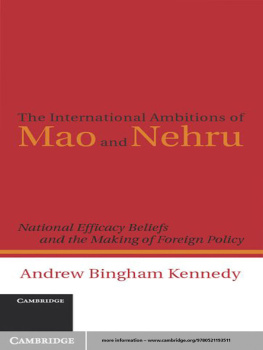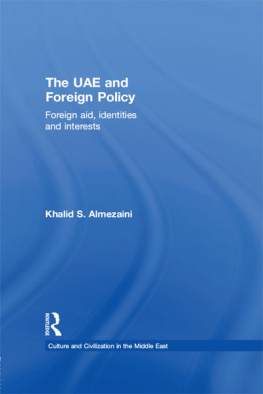First published 2013 by Ashgate Publishing
Published 2016 by Routledge
2 Park Square, Milton Park, Abingdon, Oxon OX14 4RN
711 Third Avenue, New York, NY 10017, USA
Routledge is an imprint of the Taylor & Francis Group, an informa business
Copyright 2013 Howard J. Wiarda
Howard J. Wiarda has asserted his right under the Copyright, Designs and Patents Act, 1988, to be identified as the author of this work.
All rights reserved. No part of this book may be reprinted or reproduced or utilised in any form or by any electronic, mechanical, or other means, now known or hereafter invented, including photocopying and recording, or in any information storage or retrieval system, without permission in writing from the publishers.
Notice:
Product or corporate names may be trademarks or registered trademarks, and are used only for identification and explanation without intent to infringe.
British Library Cataloguing in Publication Data
Wiarda, Howard J., 1939-
Culture and foreign policy : the neglected factor in international relations.
1. International relations and culture--Case studies. 2. United States--Foreign relations.
I. Title
327.73-dc23
Library of Congress Cataloging-in-Publication Data
Wiarda, Howard J., 1939-
Culture and foreign policy : the neglected factor in international relations / by Howard J. Wiarda.
p. cm.
Includes bibliographical references and index.
ISBN 978-1-4094-5329-1 (hardback) 1. United States--Foreign relations. 2. Political culture--United States. I. Title.
JZ1480.W53 2012
327.73--dc23
2012019084
ISBN 9781409453291 (hbk)
ISBN 9781315575438 (ebk)
Preface
In 1992 Francis Fukuyama published his famous book, The End of History and the Last Man. Fukuyama is one of the countrys leading political scientists and a well-known public intellectual; when he speaks on political and cultural issues, the country takes notice. His book immediately set off a buzz of controversy.
Published in the early 1990s, Fukuyamas study was brimming with optimism. The Soviet Union had just been vanquished in the Cold War; democracy seemed to be replacing both authoritarianism and communism as the only game in town, and, flush from its triumph over the U.S.S.R., the U.S. was riding high and had, then, no known enemies. The U.S. model of democracy, open-market capitalism, and free trade seemed everywhere triumphant; Fukuyamas followers were proclaiming that, with time, all countries would soon be democratic and market-friendly. It was in this context, when democracy and free-market capitalism were everywhere on the march, that Fukuyama proclaimed his end of history.
We should dispense, first, with the frivolous criticisms leveled at Fukuyama. He did not mean, obviously, that history had, literally, ended. Fukuyama and his book are much too intelligent for such silliness. No, what Fukuyama meant by history ending was in the tradition of the great nineteenth-century German philosopher, Georg Friedrich Hegel. In contrast to Marxs focus on class struggle as the driving force in history, Hegel posited that spirit or ideas were the main driving force. And in this battle of ideas, Fukuyama has concluded, democracy has emerged as the last and also best idea standing. No other idea now or in the future can compete with it. Hence, his title of The End of History.
About the same time that Fukuyama was publishing his well-known and provocative book, another famous political scientist and public intellectual, Samuel P. Huntington, was writing the first drafts of his equally important and perhaps even more controversial book, The Clash of Civilizations. democracy; support for Huntingtons argument comes from the increasing rivalry between the United States and Asia and from the war on terrorism which mainly seems to involve the U.S. and (fundamentalist) Islam.
Well, there we have it: the two great and conflicting paradigms with which we entered the twentieth century. The one (Fukuyamas) is positive and optimistic; it lies at the heart of Americas efforts over the last twenty-five years to build democracy, advance human rights, solidify civil society, and assist free market capitalism on a global basis. This agenda is associated with what is called liberal internationalism in the international relations field, and mainly with the foreign policy orientation of the Democratic Party, although both George H.W. Bushs New World Order and George W. Bushs efforts to bring democracy to the Middle East, by force of arms if necessary (Iraq, Afghanistan), also emerged out of a Fukuyama-like approach to the world. Surely the Obama Administration, with its emphasis on engagement, diplomacy, and multilateralism, is a reflection of this tradition.
Huntingtons clash of civilizations, in contrast, is much more pessimistic. It is closely associated with conservative internationalism (both liberal and conservative internationalism enjoy the support of about one-third of the electorate) and with the Republican Party, or at least the Richard Cheney, Donald Rumsfeld, John McCain, and, should we say it, the Sarah Palin wing of the Republican Party. It presumes a large defense budget and less attention to democracy or nation-building.
So, which is it? Are we in a period of the end of history or a period of the clash of civilizations? Is democracy steadily advancing or are we in for a period of protracted conflict with the Islamic world? Who is right, Fukuyama or Huntington? The debate could not be much more polarized than that. The two positions would seem to start off from vastly different assumptions; they marshal quite different evidence; and they seem to reach diametrically opposite policy conclusions.
More recently, and in a related vein, the debate has spread to the issue of globalization. Is globalization peaceful, benign, and positive, implying the further spread of globalizations main agents including democracy, free trade, and free markets; or is it destructive and prone to produce unemployment and conflict over scarce resources? Is there one, universal globalization la George H.W. Bushs New World Order, or what Peter Berger has recently described as plural or many globalizationsgreater diversity, with each of the worlds main culture areas (the Islamic Middle East, Russia, Asia, Latin America, etc.) increasingly going their own way?
The recent worldwide economic downturn and crisis have given added importance as well as immediacy to this debate. The debate, if it had not done so before, has now impacted the lives of almost all peoples. For what the downturn has done is to raise again issues that, in Fukuyamas view, had already been settled. These include such large and fundamental issues as the size of the state and its role in the economy, whether capitalism can be reformed and made to work again, and whether socialism and central state planning, in decline since the end of the Cold War, will stage a comeback and serve again as an alternative to liberal democracy and free-market economics. To the extent that democracy and free-market capitalism remain the preferred solution for most countries, Fukuyama and the globalists will seem to have been vindicated; but should markets and countries go into crisis and democracys spread be slowed or reversed, Huntingtons clash thesis or Bergers many globalizations will look better.

